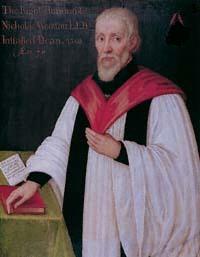Nicholas Wotton facts for kids
Nicholas Wotton (born around 1497 – died 26 January 1567) was an important English figure. He was a diplomat, which means he helped countries talk to each other. He was also a cleric, meaning he was a church leader, and a courtier, someone who worked closely with the king or queen.
Nicholas Wotton held big jobs like the Dean of York, a senior church position. He also served as a Royal Envoy, a special messenger for the king, to Charles V, Holy Roman Emperor.
Contents
Early Life and Church Career
Nicholas Wotton was the son of Sir Robert Wotton from a place called Boughton Malherbe in Kent. His family had a history of important people. He was related to an earlier Sir Nicholas Wotton. This ancestor was the Lord Mayor of London twice, in 1415 and 1430. He also served as a Member of Parliament for the City for many years.
After becoming a church leader, Nicholas Wotton was given several church roles. These included leading churches in Boughton Malherbe, Sutton Valence, and Ivychurch, all in Kent.
Working for the Bishop
Nicholas Wotton wanted to do more than just church work. He started working for Prince-Bishop Cuthbert Tunstall, who was the Bishop of London. This was a big step into a more public life.
Royal Diplomat and Advisor
Nicholas Wotton became very involved in important royal matters. He helped create a religious document called the Institution of a Christian Man. This showed his skill in both church and state affairs.
Arranging Royal Marriages
In 1539, King Henry VIII sent Wotton on a special mission. His job was to help arrange the king's marriage to Anne of Cleves. This marriage was also meant to create an alliance with Protestant leaders in Europe.
Wotton traveled back to England with the new queen. Even when King Henry VIII later ended his marriage to Anne, Wotton remained in the king's good favor. This was unlike some others, like Thomas Cromwell, who lost the king's trust.
High-Ranking Church and State Roles
In 1541, Nicholas Wotton was offered the chance to become the Bishop of Hereford, but he turned it down. Instead, he became the first Dean of Canterbury after the big changes of the Reformation. In 1544, he also became the Dean of York.
From 1543, Wotton went on many diplomatic trips to the Netherlands. He spent a lot of time talking with Emperor Charles V. These discussions were very important for England's relationships with other countries.
Treaties and Secretary of State
In 1546, Wotton helped to finalize the Treaty of Ardres. This was an important peace agreement between England and France. After this, he lived in France as England's Ambassador from 1546 to 1549.
King Henry VIII trusted Wotton so much that he named him an executor of his will. This meant Wotton was responsible for making sure the king's wishes were carried out after his death. Henry VIII also left him £300.
In October 1549, during the reign of Edward VI, Wotton took on another major role. He became the Minister of State. He held this powerful position for about a year. Later, Sir William Cecil, a well-known Protestant, took over the role.
Later Diplomatic Missions
In 1550, Wotton was again sent as a Royal Envoy to the Holy Roman Emperor. He also served as Ambassador to France during the reign of Mary. He did very important work to help secure peace between nations.
He left France in 1557. However, in 1558, he was back in France. This time, he helped set up the early talks for the Treaty of Cateau-Cambrésis. This was another major peace treaty.
In 1560, Wotton signed the Treaty of Edinburgh on behalf of Elizabeth I. He also visited the Netherlands again before he passed away in London.
Legacy and Burial
Nicholas Wotton is buried in the Trinity Chapel of Canterbury Cathedral. This is a very important and historic church in England.
 | Frances Mary Albrier |
 | Whitney Young |
 | Muhammad Ali |


